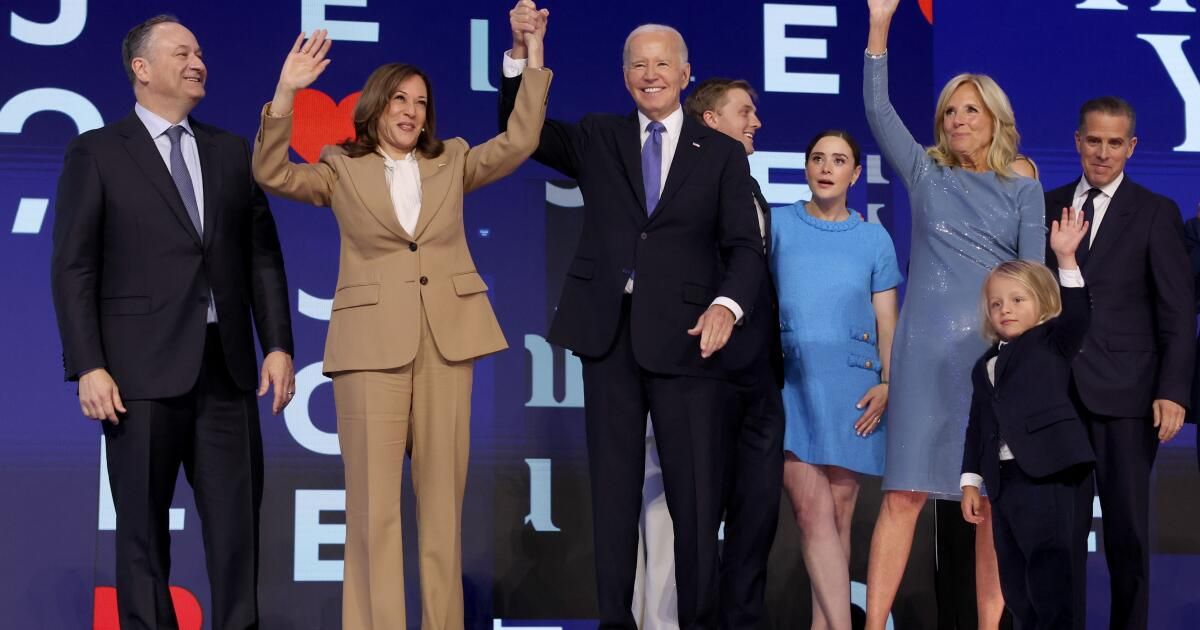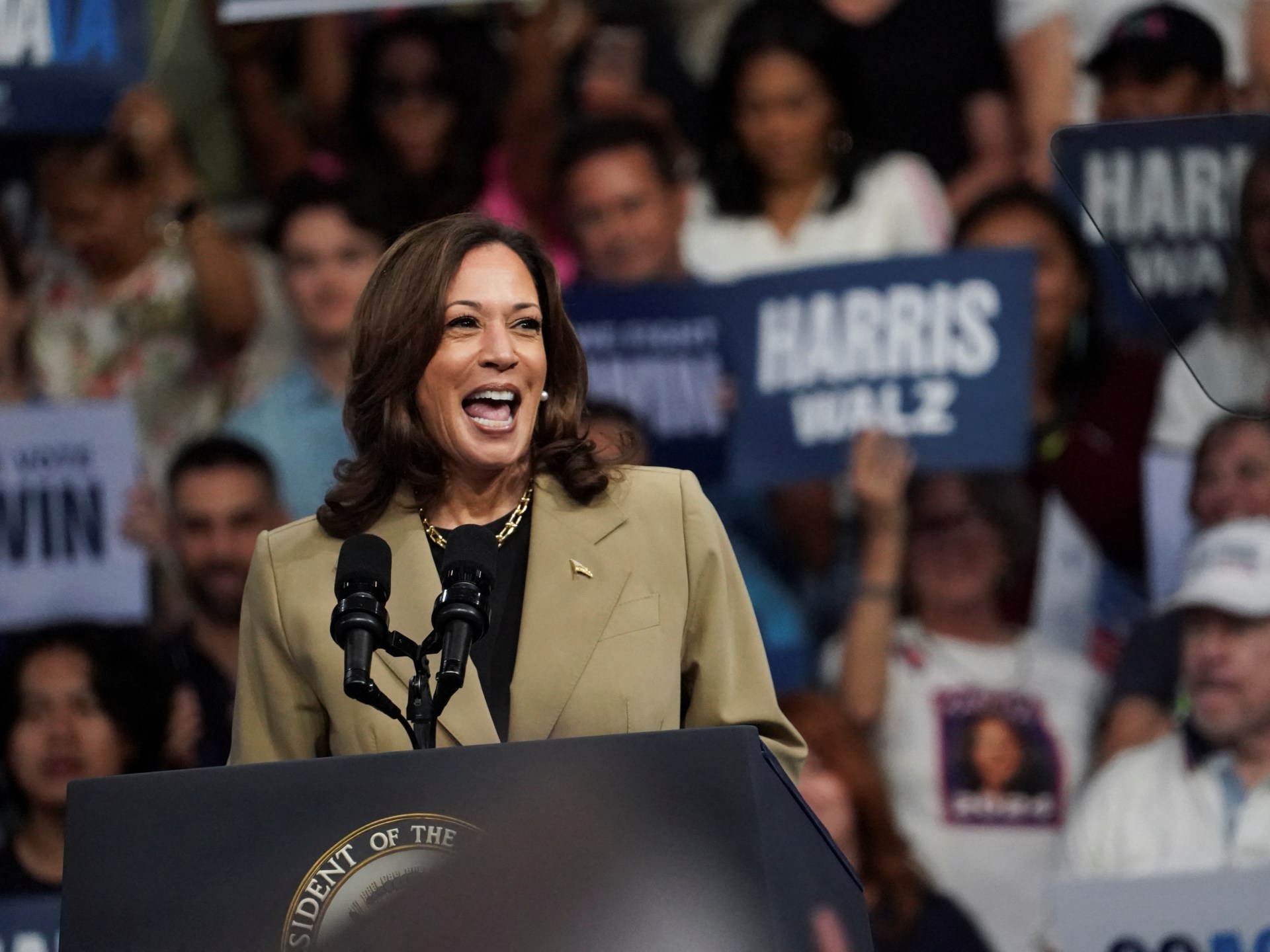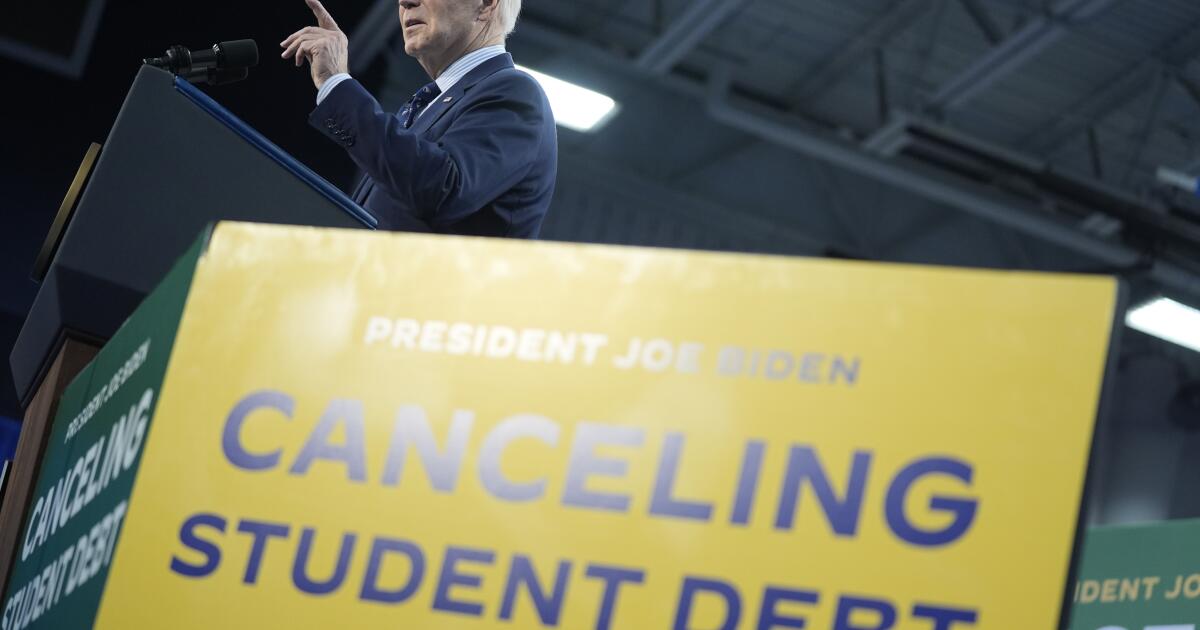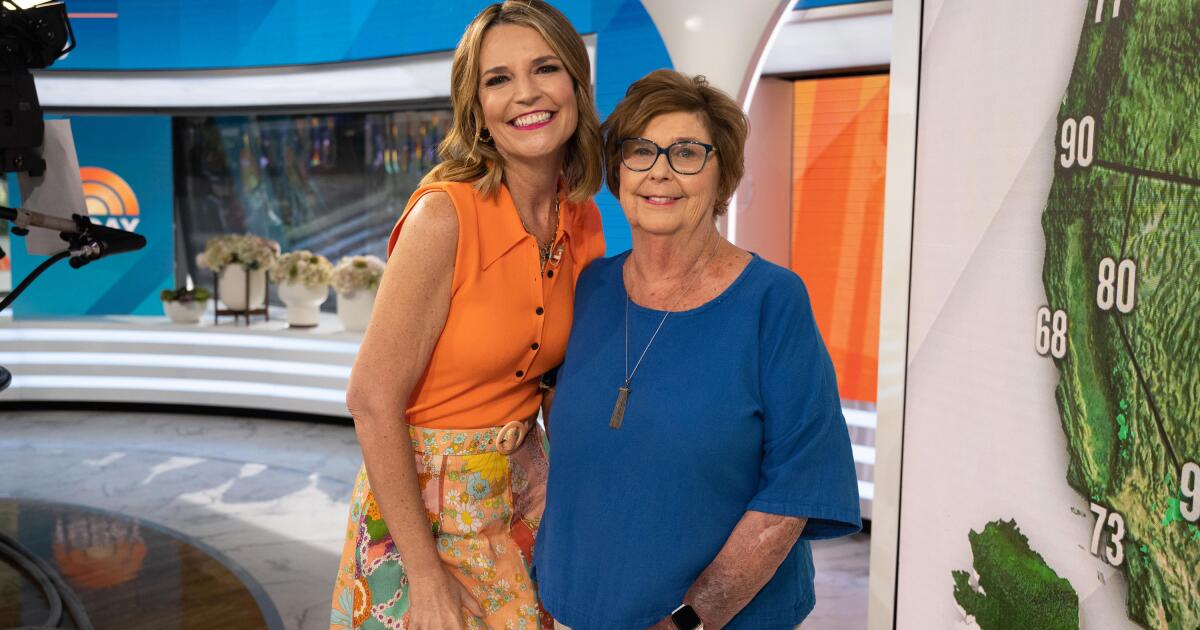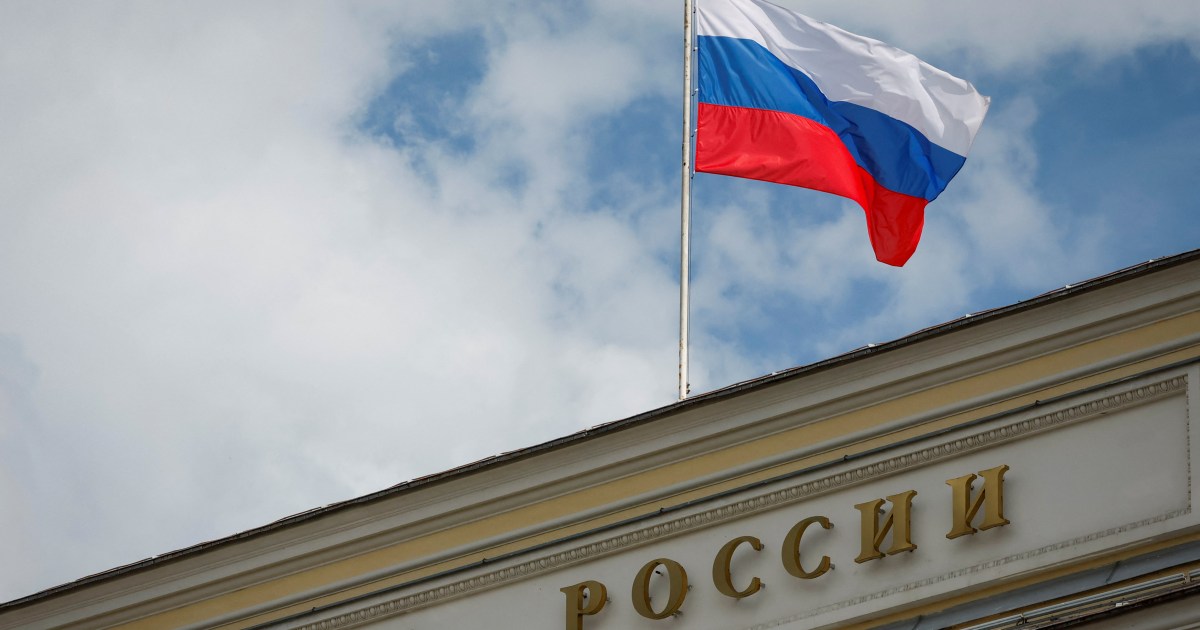The Democratic National Convention began with hope, enthusiasm and smaller protests than some feared — and with a surprise appearance by a demure and conscientious Kamala Harris.
(That's a TikTok thing, if you didn't know.)
Meanwhile, the sarcasm level was sky-high as brazen supporters projected onto Trump Tower, which loomed over downtown like an extended middle finger to Democrats, a series of mocking slogans along the lines of: “Trump-Vance 'Weird as Hell.'”
That's trolling on a 92-story scale.
There were plenty of speeches and a host of entertainers, representing Democratic voters from Hollywood to Nashville (yes, there are still some Southern Democrats left).
But of course Monday night belonged to Joe Biden, the president who reluctantly stepped away from his reelection campaign and appeared only long enough to endorse Harris before making his stirring exit, long after much of the country had gone to sleep.
Columnists Mark Z. Barabak and Anita Chabria put aside deep-dish pizza to devote their energies to the convention and came away with these thoughts:
Barrabac: He came, he spoke, and he demonstrated why Democrats were happy to bid a heartfelt, but at the same time relieved, farewell to their party leader.
Biden has never been a great orator. His strong suit was knowing how to manage resources in Washington, and for just 45 minutes on Monday night the president summed up everything he had accomplished in his single term.
In short, he said, “We are building a better America.”
Biden was aware of this, too, and went out of his way to wrap Harris in the cloak of his successes (and the past three and a half years have been filled with nothing but an unbroken string of triumphs, the president says, but, hey, it's a convention speech).
After citing legislation that would lower the costs of some prescription drugs, the crowd chanted, “Thanks, Joe!”
“Thanks, Kamala too!” he interrupted.
The emotions were genuine.
Biden was greeted with a standing ovation that lasted more than four and a half minutes, the longest of the night. He pulled a white handkerchief from his breast pocket and wiped away a tear after a long hug from his daughter, Ashley, who gave him a loving introduction.
It was moving to hear Biden talk about the long arc of his career: from being too young to serve in the Senate (he was 29 when he was first elected and turned the required age of 30 shortly before being sworn in) to being too old to serve another term as president, as he eventually acknowledged.
It was also a reminder of why Democrats collectively watched the November election with their hearts in their throats — and that was even before Biden's terrible debate performance.
On Monday night, he looked 81. He was stiff, his words stumbling at times. His waxen face was frozen in a perpetual grimace. He bellowed his words, not like Harris-Walz's merry warrior, but more like a grumpy old man who kicks children out of his yard.
The contrast with Harris, who later took the stage to embrace Biden and join him in the traditional arms-raised scene, could not have been more stark.
There was speculation that the convention's schedulers had deliberately pushed the president's appearance out of prime time on East Coast television and, when it was over, into the Central time zone. Of course, party officials denied this, saying the show ran so long because the speakers were so popular that people couldn't stop cheering and applauding.
What did you think of Biden's speech?
ChabriaThe emotions were genuine, as you say, but I think they were also complex.
Nancy Pelosi had tears in her eyes, though many claim she was a key architect of Biden's exit. When Harris took the stage, she told Biden (not in front of the cameras) that she loved him.
Ashley Biden awakened the spirit of her late brother, Beau, and at the end, Biden walked off the stage with a young grandson, named after that son.
As the crowd chanted “Thank you, Joe,” Biden seemed resigned but also a little defiant about the long list of accomplishments he touted, reminding us how much he has done that seems forgotten in the heat of the election.
Until a few weeks ago, this was a proud, stubborn man who not only believed he was the best person for the presidency, but believed we did, too. So Monday night — as much as it was billed as a farewell motivated by gratitude — was also an enforced retirement for a guy who knows more about government and governance than half of Congress combined.
My conclusion is that, despite all his flaws (and we all have them), this is a man of duty and honor.
Biden quoted a line from the song “American Anthem” to sum up why he made the decision to step away from power: “What will our legacy be, what will our children say? Let me know in my heart when my days are done, America, America, I gave you my best,” he said.
And there is no doubt that he gave his best for decades.
But, as Hillary Clinton said in an earlier speech, change is afoot, and that change does not include Biden.
BarabacIt was a forward-thinking appearance by Clinton, yes. But the atmosphere of what could have been was strong when the former first lady and secretary of state took the stage.
The standing ovation lasted nearly a minute and a half, as Clinton repeatedly started and stopped amid sustained applause and cheers.
He acknowledged the outgoing president — “first, let’s say hello to President Biden” — and then spoke at length about the historic nature of Harris’s candidacy.
“Something is happening in America,” said Clinton, who was the first woman to win a major party’s presidential nomination. “It’s something we’ve long hoped for and dreamed about.”
More than 66 million Americans voted for her in 2016, Clinton said, poking more than 66 million tiny holes in the glass ceiling that has kept a woman out of the Oval Office.
She then attacked with relish the man who defeated her, not in the popular vote, but by a narrow margin in the electoral college.
“Kamala Harris,” the former district attorney and attorney general of California, “went after murderers and drug dealers. Donald Trump fell asleep at his own trial,” Clinton joked. “And when he woke up, he made his own history” by becoming the first former president convicted of a felony.
“Lock him up!” the crowd chanted, and Clinton smiled.
Anita, you fell in love with one of the non-famous speakers, didn't you?
Chabria: I really felt what April Varrett said and what she stood for.
Varrett, the first Black woman to lead the Service Employees International Union, emerged from California as the former director of SEIU Local 2015, the state's largest local union representing long-term care workers.
Its ranks include many black and brown women, several of whom are immigrants fighting poverty in an industry that is as necessary as it is underfunded. Varrett promised to create a labor movement that is “younger, darker, hipper, cooler and wears sneakers.”
That’s a powerful vision that’s already playing out in both the workplace and politics. I think in an under-reported way, this convention is about immigration and communities of color — the immigrants who drive our economy, fight for their communities, and are now claiming political power in a way that terrifies conservatives to the point of demonizing them.
Comparing the crowd at the Republican National Convention to the one in Chicago is striking. It really feels like we are in two different Americas and in an election where we must decide which one we believe in.
I was also struck by the presence of ordinary citizens speaking out about abortion access. Hadley Duvall, a Kentucky woman who was raped and impregnated by her stepfather when she was 12, stunned everyone with one question.
Trump calls the abortion ban “a beautiful thing,” he said. “What’s so beautiful about a little girl having to carry her parents’ child in her womb?”
What else caught your attention?
Barabac:How several of the night's speakers, in addition to Clinton, leaned into the historic nature of Harris's nomination as the first Black woman and first Asian American to lead a major party's presidential ticket.
That was a major theme in 2020, when Harris first ran for president, and at times it seemed like the campaign was more about her hopes of making history than what voters had in mind.
But there is no denying the groundbreaking nature of Harris's nomination, and it was celebrated with the right amount of balance and perspective.
The vice president was included in a long list of pioneering women who helped break down racial and gender barriers, including Diane Nash, Rosa Parks, Fannie Lou Hamer, Coretta Scott King and Shirley Chisholm.
“We must all understand that Black history is American history,” said NAACP President Derrick Johnson. “And in this historic moment, we will write the next chapter together.”
That remains to be seen, depending on what happens in November. But there is no doubt that the moment in Chicago stands out from all the others.

